|
|
|
Sort Order |
|
|
|
Items / Page
|
|
|
|
|
|
|
| Srl | Item |
| 1 |
ID:
082224
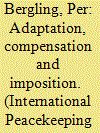

|
|
|
|
|
| Publication |
2008.
|
| Summary/Abstract |
Just as the international community was late in discovering the significance of the judiciary for the success of peacebuilding in Bosnia and Herzegovina, international agencies were also late in identifying corruption as a key reason why the Bosnian judicial agencies were not working. The steps taken eventually to address the situation, including introducing reformed judicial admission, discipline and dismissal regimes, were not strategic, but reactive in nature. Notably, the international community initially adhered to the idea that these reforms should be domestically 'owned' and 'led', and that the resulting laws should resonate well with pre-existing legal-cultural paradigms; but as this process did not produce the desired results, the Office of the High Representative and the Independent Judicial Commission chose gradually to increase their involvement, eventually assuming almost complete control over the process. The process culminated in the firing of almost the entire Bosnian judiciary and the imposition of an internationalized structure for judicial appointments and dismissals. Although this policy stood in stark contrast to the values of local ownership and local leadership, it has essentially produced positive long-term results.
|
|
|
|
|
|
|
|
|
|
|
|
|
|
|
|
| 2 |
ID:
112770
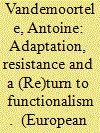

|
|
|
|
|
| Publication |
2012.
|
| Summary/Abstract |
This article analyzes the police restructuring process in Bosnia, and more specifically the role of the European Union in this process, to understand what, and how, different practices, routines and patterns of resistance influenced the timing, direction and outcome of this reform process. It provides a new angle to understand the final outcome of police restructuring by looking at actors' preferences, positions within the field of Security Sector Reform (SSR) and their strategies. The main argument is that a process of 'muddling through' was created by the combination of adaptation and resistance techniques employed by international, European and local actors in the broader police reform dynamics. By empirically demonstrating how and why specific practices of key actors influenced the policy-making process, this article provides a preliminary framework to reassess SSR activities as part of a field of practice, to be analyzed through a sociological lens.
|
|
|
|
|
|
|
|
|
|
|
|
|
|
|
|
| 3 |
ID:
131624


|
|
|
|
|
| Publication |
2014.
|
| Summary/Abstract |
European Union (EU) interventions in conflict countries tend to focus on governance reforms of political and economic frameworks instead of the geopolitical context or the underlying power asymmetries that fuel conflict. They follow a liberal pattern often associated with northern donors and the UN system more generally. The EU's approach diverges from prevalent governance paradigms mainly in its engagement with social, identity and socio-economic exclusion. This article examines the EU's 'peace-as-governance' model in Cyprus, Georgia, Palestine and Bosnia and Herzegovina. These cases indicate that a tense and contradictory strategic situation may arise from an insufficient redress of underlying conflict issues.
|
|
|
|
|
|
|
|
|
|
|
|
|
|
|
|
| 4 |
ID:
082358
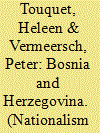

|
|
|
|
|
| Publication |
2008.
|
| Summary/Abstract |
This essay seeks to move beyond the traditional discussions on state change in Bosnia-Herzegovina by assessing the usefulness of shifting attention away from state- and institution-building efforts by domestic or international political elites and by focusing instead on the actions of local nonstate actors. We advocate a theoretical investigation into what might be gained from devoting new scholarly attention to identity-forming processes at the sidelines of governmental politics. We add empirical support to our argument by analyzing the work of a number of organizations in Bosnia that mobilize Bosnian citizens along nonethnic lines and construct alternative state-building narratives
|
|
|
|
|
|
|
|
|
|
|
|
|
|
|
|
| 5 |
ID:
133578
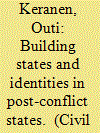

|
|
|
|
|
| Publication |
2014.
|
| Summary/Abstract |
An integral part of state formation processes is identity-building: 'making one out of many' as Walzer puts it. This is also true in terms of contemporary, internationally led statebuilding projects. This dimension of international statebuilding is important, as fundamental questions pertaining to belonging are as important to successful post-conflict process as institutional arrangements; in fact, assumptions about identities and group boundaries guide the technical decisions on institutional and governance structures. The central aim of this paper is to reflect upon identity-construction as a part of post-conflict statebuilding through exploring how historical and more recently invented symbols are deployed to construct a specific sense of belonging. The analysis finds a multiplicity of identity-building projects that advance different visions of community and belonging. The outcome is politicised and contentious visual, everyday landscape that legitimises competing local statebuilding projects (grounded in the distinctions between Bosnian peoples), while undermining peacebuilding and reconciliation. Yet, rather than indicating a primordial antagonisms or incompatible 'liberal' and 'local' norms, the conflicts over symbols (and ultimately, identities) between international and local agents are indicative of wider disagreements over how the Bosnian state ought to be organised and are fuelled by the institutional structures of the country and the weaknesses in the international statebuilding
|
|
|
|
|
|
|
|
|
|
|
|
|
|
|
|
| 6 |
ID:
143283
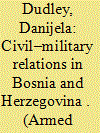

|
|
|
|
|
| Summary/Abstract |
Nearly two decades after the civil war, Bosnia and Herzegovina has yet to establish democratic control over its armed forces. While there is a widespread consensus that democratic consolidation is desirable, the process has been impeded by continuing challenges to state legitimacy. With three ethnic groups challenging state legitimacy, the reform efforts have been overshadowed by each group’s fears of others’ future intentions, leading thus to the maintenance of three armies for a decade after the war and nondemocratic defense relations to this day. The levels of challenges to state legitimacy, however, have varied. Due to the changing political environment, the early 2000s were characterized by a relative absence of nationalist rhetoric, allowing thus significant reforms of the defense sector. However, with reemergence of challenges to state legitimacy in 2006, the reform efforts came to a stalemate, leaving the newly established defense institutions without the capacity necessary for their functioning.
|
|
|
|
|
|
|
|
|
|
|
|
|
|
|
|
| 7 |
ID:
108691
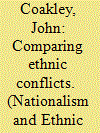

|
|
|
|
|
| Publication |
2009.
|
| Summary/Abstract |
Notwithstanding predictions over the past century and a half that minorities defined in ethnic, linguistic, or cultural terms would gradually reconcile themselves to coexistence in states dominated by metropolitan cultures, difficulties arising from the mobilization of minority communities continue to be pronounced at the beginning of the twenty-first century. This article provides an overview of the extent of ethnic division in modern states, describes characteristic patterns of ethnic mobilization and focuses on a smaller set of illustrative cases that reveal many of these patterns. In this, it defines the context for a set of case studies that follow: Belgium, Spain, Northern Ireland, Bosnia and Herzegovina, Cyprus, Lebanon, South Africa, and Sri Lanka.
|
|
|
|
|
|
|
|
|
|
|
|
|
|
|
|
| 8 |
ID:
123224
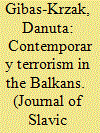

|
|
|
|
|
| Publication |
2013.
|
| Summary/Abstract |
The aim of this article is to examine the terrorism in the Balkans. Contemporary Islamic terrorism in the Balkans is caused by the increase of influences of Muslim fundamentalists, especially in Bosnia and Herzegovina. The origins of Islamic terrorism are connected with radical trend of this religion, which became popular in the society in the period of socialist Yugoslavia. However, this trend could be widespread on a larger scale only when Mujahideen came to Bosnia and Herzegovina to take part in the civil war. In Bosnia and Herzegovina, it was the religious fanatics who mainly participated in the fighting. Many of them were the members of terroristic organizations, such as Al-Qaeda, Hezbollah, Hamas, and Al-Gama'a al-Islamiyya. A considerable number of 'Warriors of Allah' remained on the territory of Bosnia and Herzegovina after the end of the civil war, thus, contributing to the development of the terrorist network connected with radical factions of Islam. The author emphasizes that is essential to take complex actions that aim to fight this threat by international cooperation of special services and the police as a part of the European Union (UE) mission. It is even more important since West Balkans actively participate in the UE and North Atlantic Treaty Organization (NATO) integration processes.
|
|
|
|
|
|
|
|
|
|
|
|
|
|
|
|
| 9 |
ID:
152480
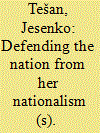

|
|
|
|
|
| Summary/Abstract |
This article offers and applies a framework for understanding nation-(re)-building after a major transition and crisis, like a war. It suggests socioanthropological concepts: liminality, mimesis, rites of passage, and tricksters. An understanding of the logic behind the emergence of nationalist tricksters can offer knowledge for an arguably better conflict-handling mechanism in deeply divided societies. It addresses, via the case study of Bosnia and Herzegovina (B&H), the following question: What is an adequate understanding of the postconflict self in B&H? The aim is to reconceptualize nationalism and the break-up of Yugoslavia (as well as the post-Dayton B&H) as a liminal process, in which trickster nationalists perpetuate schismatic conflict. The article concludes that trickster nationalists seem to be responsible for the current state of permanent liminality in B&H societies.
|
|
|
|
|
|
|
|
|
|
|
|
|
|
|
|
| 10 |
ID:
137421
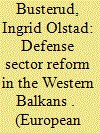

|
|
|
|
|
| Summary/Abstract |
This article analyses two different approaches to defense sector reform (DSR) in the Western Balkans. It explores the role of NATO in the reform process in Bosnia and Herzegovina (BiH), as well as Norway's involvement in Montenegro. Based on this, the article then compares and contrasts the two processes, and looks at the factors that have influenced their success or failure. The analysis show that both BiH and Montenegro have taken significant steps towards Euro-Atlantic integration, and that NATO and Norway have succeeded in part of their work to assist this effort. However, it also suggests that certain key factors for success in SSR have been less than optimal, such as donor coordination and the principle of local ownership. Both actors are also limited by the lack of a conceptual framework or guidelines for their work on DSR.
|
|
|
|
|
|
|
|
|
|
|
|
|
|
|
|
| 11 |
ID:
132895
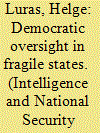

|
|
|
|
|
| Publication |
2014.
|
| Summary/Abstract |
In most transition countries the main aim of 'democratizing intelligence' is to weaken the authoritarian governmental structures by introducing more transparency, legality and oversight. In Bosnia and Herzegovina however, the state-building efforts driven by international parties combined formal democratization processes such as independent oversight with the strengthening and operational capacity building of previously weak-to-non-existent intelligence structures. In parallel with the descent into war when Yugoslavia collapsed in the early 1990s, the State Security Service (SDB) in the Republic of Bosnia had split into three ethnically-based outfits answering to the political and military leaders of war. 'Democratization' of intelligence in Bosnia and Herzegovina since the establishment of a unified, state-level Intelligence and Security Agency (OSA) in 2004 has followed its own unique path reflecting the fragmented nature of politics in Bosnia and the leading role of international organizations in proposing and effectuating institutional reforms. Nevertheless, in terms of habits, operational methods and values many Bosnian intelligence officers went through similar adaptations and transitions as their colleagues in countries where institutions at the time of democratic transition were too strong and authoritarian rather than, as in the case of Bosnia, being deemed too weak and ineffectual.
|
|
|
|
|
|
|
|
|
|
|
|
|
|
|
|
| 12 |
ID:
113162


|
|
|
|
|
| Publication |
2012.
|
| Summary/Abstract |
'Before we send our troops into a foreign country, we should know how and when we're going to get them out', US National Security Adviser Anthony Lake intoned in 1996, two years after the precipitate withdrawal of US forces from Somalia. Yet rarely has this requirement been met. Planning for exit as precisely as Lake's comments would suggest is difficult if not impossible, as the Clinton administration would discover in Bosnia and Herzegovina only months later. No one can foresee the circumstances that will obtain, and the course adjustments they may necessitate, once an operation has been launched. But this is not to say that more informed planning for exit is not possible. Not only has the subject of exit strategies received comparatively little sustained scholarly attention; it is also fair to say that policy in this area has been more ad hoc than carefully thought out.
|
|
|
|
|
|
|
|
|
|
|
|
|
|
|
|
| 13 |
ID:
132825
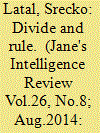

|
|
|
|
|
| Publication |
2014.
|
| Summary/Abstract |
Ethnic divisions among ruling and opposition parties have led to a growing political crisis in Bosnia and Herzegovina. Srecko Latal look at three scenarios for the October elections, which are likely to be characterized by increasingly radical campaigns.
|
|
|
|
|
|
|
|
|
|
|
|
|
|
|
|
| 14 |
ID:
142276
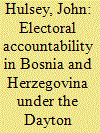

|
|
|
|
|
| Summary/Abstract |
This article examines the ways in which Bosnia's continuing governance problems are rooted in the relationship between voters and parties implied in the Dayton Accords. Political competition and the party system in Bosnia are influenced by the structure of government and electoral system in the Dayton Accords and subsequent regulations, which gives preference to a model of representation based on ethnic parties. This article examines the party system and nature of competition in order to show the weaknesses in this ethnic model of representation as well as the ongoing inability to establish alternative models such as broad multi-ethnic parties.
|
|
|
|
|
|
|
|
|
|
|
|
|
|
|
|
| 15 |
ID:
108703
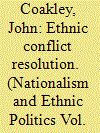

|
|
|
|
|
| Publication |
2009.
|
| Summary/Abstract |
This article generalizes on the basis of a set of case studies of ethnic conflicts that have followed different routes towards the goal of a long-term settlement: Belgium, Spain, Northern Ireland, Bosnia and Herzegovina, Cyprus, Lebanon, South Africa, and Sri Lanka. It begins by reviewing the significance of ethnicity in the modern state, exploring the political implications of different terminologies in this area. Having examined the patterns of political mobilization of ethnic groups (whether in the form of the party system or in the shape of military-type formations), it looks at the kinds of political outcome that have been associated with settlement processes. In addition to "solutions" that would be regarded as politically unacceptable, it identifies three common features which, depending on specific local circumstances, commonly occur: federal or other territorial arrangements, consociational government, and the political integration of minorities.
|
|
|
|
|
|
|
|
|
|
|
|
|
|
|
|
| 16 |
ID:
117631
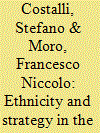

|
|
|
|
|
| Publication |
2012.
|
| Summary/Abstract |
The impact of ethnicity for the onset of conflicts has often been dismissed in the cross-country empirical literature on civil wars. Recently, however, several studies using disaggregated data have reached different conclusions and highlight the importance of the configuration of ethno-national groups. This article follows the latter approach and investigates a different phenomenon: the impact of ethnic heterogeneity on the severity of violence. Using disaggregated data at municipality level in Bosnia and Herzegovina, we perform a quantitative analysis to assess the impact of various indices of heterogeneity on the number of casualties that occurred in the 1992-95 war in the 109 municipalities composing the country. We argue that in a context where ethnicity plays a key role in shaping rivalry among groups, ethnic polarization, in particular, creates strategic incentives for severe violence as armed groups try to create ethnically homogenous territories in the first phase of the war. By also including the temporal dimension in the analysis, we show that ethnic polarization loses its impact as the war evolves over time; therefore, the geographic location of the municipalities becomes the best predictor of severe clashes because as the war goes on, ethnic groups shift their objective from creating internally homogenous municipalities to consolidating wider areas. As such, municipalities located on politically and militarily relevant frontlines experience the highest levels of violence.
|
|
|
|
|
|
|
|
|
|
|
|
|
|
|
|
| 17 |
ID:
157981
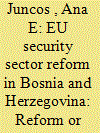

|
|
|
|
|
| Summary/Abstract |
Attempts to explain the failure to reform the security sectors in post-conflict countries have often resorted to two sets of explanatory factors: international and local factors. This article seeks to move from that unhelpful dichotomy to an explanation linking both factors. Drawing on a Foucauldian approach and the concept of “counter-conduct,” it examines the rationality and practices of European Union (EU) governmentality and how governing technologies are resisted and reversed by local elites involved in security sector reform (SSR). Instead of understanding power and resistance as binary opposites, this article argues that counter-conduct can be conceived as implicated in the very relations of power that it seeks to resist. To tease out these relations, the article analyzes the EU's efforts in SSR in Bosnia and Herzegovina, where it identifies four forms of counter-conduct: upholding European standards, using the local ownership trap, simulating reforms, and lowering the bar.
|
|
|
|
|
|
|
|
|
|
|
|
|
|
|
|
| 18 |
ID:
143797
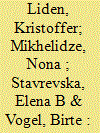

|
|
|
|
|
| Summary/Abstract |
From a peacebuilding perspective, EU support for civil society organizations (CSOs) in conflict-ridden countries can be criticized for artificially boosting a liberal, ‘bourgeois’ civil society at the expense of more representative initiatives at the grassroots level. Seen from a governance perspective, however, this criticism is lacking in nuance and conceals the actual rationale and effects of the support. To advance a realistic debate on international peacebuilding as a form of governance, this article investigates what the character and effects of EU support for CSOs in conflict-ridden countries actually are: how does it affect the relations between the supported organizations and (1) the wider society, (2) the state and (3) between the recipient country and the EU? We consider four ideal types of EU conflict governance: ‘liberal peace’, ‘hollow hegemony’, ‘vibrant hegemony’ and ‘post-liberal peace’ and compare them to empirical data from Bosnia and Herzegovina, Cyprus and Georgia. We find that while the objectives of promoting peace and democracy through CSO support tend to fail, the strategic interests of the EU are still maintained.
|
|
|
|
|
|
|
|
|
|
|
|
|
|
|
|
| 19 |
ID:
142484
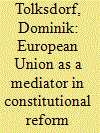

|
|
|
|
|
| Summary/Abstract |
The complex constitutional system in Bosnia and Herzegovina, intended to ensure power sharing between the three main ethnic groups, is characterized by a variety of veto rights in the legislative process. Not only has this system prevented swift decision making but it also discriminates parts of Bosnian society that do not belong to one of the three constituent peoples. The European Union, alongside other organizations, has for years called for these shortcomings to be addressed but has failed in its efforts to bring the intransigent Bosnian policy makers to agree on a compromise and to end the political stalemate in the country. The EU's activities to support constitutional reform were themselves ill fated. By introducing three criteria to systematically analyze the EU's policies, the article illustrates that the EU, after initial reluctance to become seriously engaged as a mediator in the reform negotiations, applied its conditionality inconsistently.
|
|
|
|
|
|
|
|
|
|
|
|
|
|
|
|
| 20 |
ID:
133135
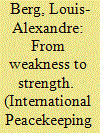

|
|
|
|
|
| Publication |
2014.
|
| Summary/Abstract |
The mixed results of efforts to reform the governance of security forces in the aftermath of conflict require deeper examination of the political constraints that shape statebuilding processes. In Bosnia and Herzegovina, attempts to restructure and centralize the security forces led to a substantial though incomplete reform of the military, but limited impact on the police forces. These uneven results are rooted in the nature of political coalitions that constrain recipient leaders and shape their interaction with external actors. While Bosnian leaders mostly relied on a cohesive political base that favoured close links between political parties and the police forces, fragmentation within these parties generated internal threats that enabled reforms to the military. This case demonstrates the limits of external influence without changes to underlying political conditions.
|
|
|
|
|
|
|
|
|
|
|
|
|
|
|
|
|
|
|
|
|